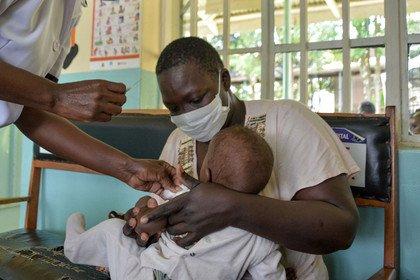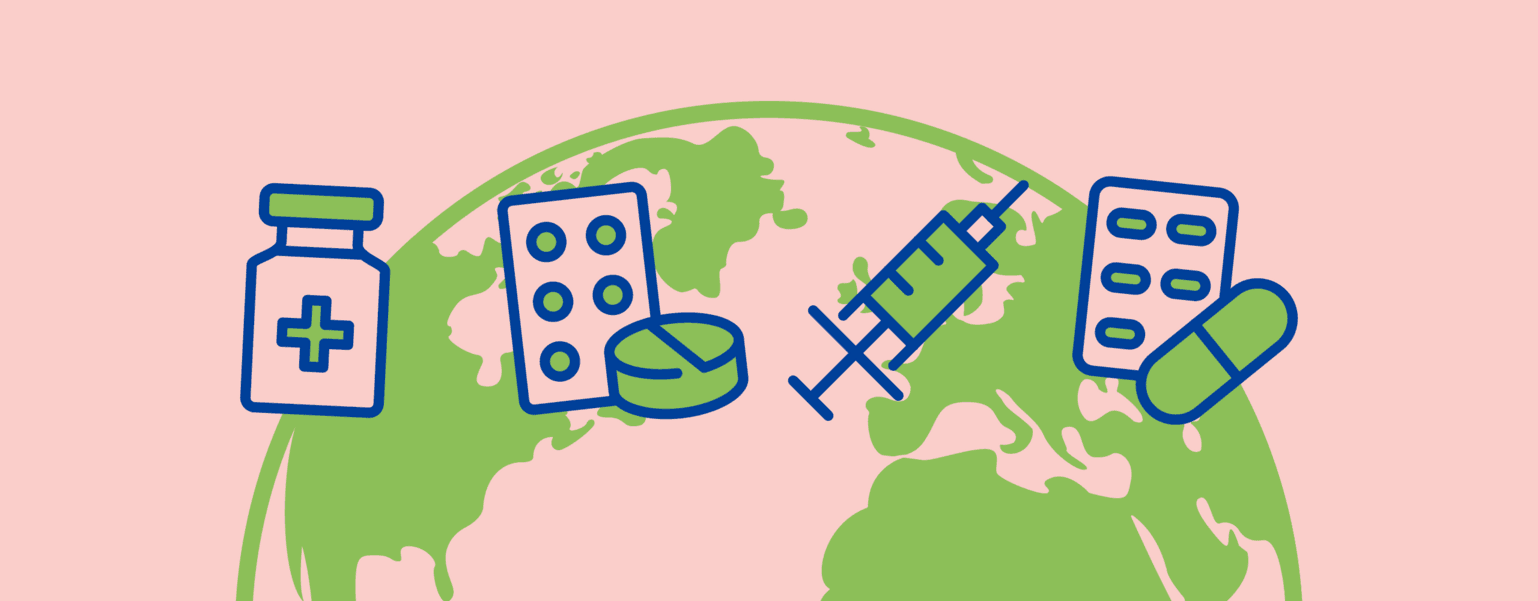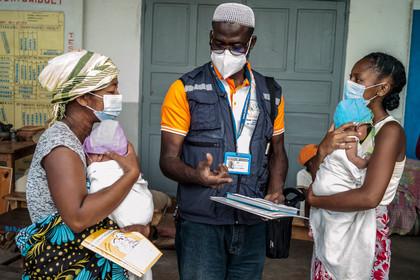
From drug discovery to delivery, we need to do more to fight infectious diseases
The way we tackle the urgent health threat of infectious diseases is largely led by countries and organisations in the global north, competition and profit. How can we create a better research and development ecosystem that meets the needs of everyone, everywhere?
Summary
How can we fix the research and development ecosystem for infectious disease?
- Infectious diseases still cause around a quarter of deaths worldwide.
- Resources for disease research and development (R&D) are limited and most medical advances originate in the global north.
- At Wellcome, we envision an R&D ecosystem that is led by the global majority, driven by collaboration and innovation, and responsive to longer-term, local needs.
From new treatments for drug-resistant tuberculosis to the first-ever vaccines for malaria – huge progress has been made in recent decades to protect people against infectious diseases.
How we prepare and respond to these threats is primarily led by the research and development (R&D) ecosystem for infectious disease. This ecosystem is vast and consists of processes, people and institutions that work to get innovative, life-saving products to the people that need them.
The ecosystem includes many stages, from the setting of research priorities, discovery and clinical trials to regulation, manufacturing and marketing of approved products.
Despite recent progress to prevent and treat diseases, the current research and development ecosystem fails to meet people’s needs – and infectious diseases still cause around a quarter of deaths worldwide.
Resources for disease research and development are limited and most medical advances originate in the global north. This means that they often reflect the needs of people living in richer countries, rather than the needs of the communities most affected by infectious diseases.
We need to reform the ecosystem to make sure that products to detect, prevent and treat life-threatening illnesses are accessible, affordable, available and appropriate for everyone.
Towards a reformed R&D ecosystem for infectious disease
Wellcome improves health for everyone by funding research and we want to help create the right environment for research to have an impact. That’s why we’ve developed a discussion paper outlining what we believe are some of the current problems that exist within the research and development ecosystem for infectious diseases – and the changes that are needed.
Here we look at how the world’s response to three of the largest infectious disease threats highlights the need for change.
Cholera
Cholera is a bacterial disease typically spread through contaminated food or water. While we have the necessary tools to prevent and control this disease, the global vaccine supply for cholera is not meeting the demand.
Cases were reported in 44 countries in 2022. In the same year, the number of cholera vaccine manufacturers fell to one, further intensifying the problem.
To meet this demand, in October 2022 the World Health Organization started temporarily scaling back vaccination programmes. People in countries with reported cholera outbreaks, including Haiti, Syria and Malawi, are receiving one dose of the oral cholera vaccine instead of the standard two.
There have been significant efforts to increase vaccine production but doing so is challenging in the current system of research and development. Vaccine manufacturing predominantly takes place in high-income countries and prioritises profit-making vaccines, and limited funding and unpredictable long-term demand reduces the incentive to manufacture cholera vaccines. Meanwhile, there’s a lack of manufacturing capacity and capability in low- and middle-income countries where the burden of cholera is highest.
At Wellcome, we recently worked with the Bill and Melinda Gates Foundation to help scale up vaccine supply. We supported an agreement that will see the International Vaccine Institute (IVI) in South Korea share its know-how, technologies and processes with Biovac in South Africa to develop and manufacture a cholera vaccine for African and global markets. But more needs to be done to strengthen vaccine regulation and manufacturing systems around the world so that all countries can act quickly and in a sustainable way to tackle disease outbreaks.
Drug-resistant infections
Drug-resistant infections were linked with more than a million deaths globally in 2019, according to The Lancet. This number could rise to ten million by 2050 without appropriate action against the threat.
Infections become resistant to the drugs used to treat them over time because the microbes that cause them are constantly evolving. So, we need a pipeline of new antibiotics to keep fighting drug-resistant infections as they change. We also need to use antibiotics appropriately, to avoid unnecessarily exposing bacteria to them and limit the opportunities for bacteria to adapt and survive.
However, developing new antibiotics is a slow and expensive process. Most antibiotics have a high failure rate and do not progress to the human clinical trial stage. It can take between 10 to 15 years and cost over one billion to produce a new antibiotic. And, as they can become ineffective against the infections they’re made to treat, they're simply not profitable. As a result, big pharmaceutical companies have stopped investing in antibiotics research. Meanwhile, smaller companies that pursue this research face massive financial risk and can go bankrupt.
There are many ideas to reform the market – such as paying pharmaceutical companies up front for their work – but collaborative action from governments, pharmaceutical companies and philanthropy is needed to implement them.
Transforming the world’s response to slowing down drug-resistant infections is a priority for Wellcome. That’s why we’re supporting innovative partnerships like CARB-X and the AMR Action Fund, which invest in discovering new treatments for these life-threatening infections.
Tuberculosis
More than 10 million people continue to fall ill with tuberculosis (TB) worldwide, every year. TB is a bacterial disease that spreads through the air and often affects people’s lungs. Although the disease is preventable and curable, in 2022, it was the world’s second leading cause of death from a single infectious agent.
TB is present in all countries but it mainly affects people living in low- and middle-income countries. In 2021, 68% of TB cases were in South-East Asia and Africa. A lack of visibility of the disease in high-income countries, which typically set investment priorities for products, has slowed the development of new vaccines and treatments.
The only licensed vaccine for TB was created a century ago. While it is moderately effective in protecting infants and young children from the disease, it is not as effective for adolescents and adults, who account for 90% of TB infections. There have also been only two drugs developed for TB in the last 50 years, but the treatment regimes take several months to work and sometimes years for people with drug-resistant TB. The high prices manufacturers set for TB drugs and diagnostic tests also mean they are less widely available in countries most affected by the disease.
At Wellcome, we’ve partnered with the Bill & Melinda Gates Foundation to fund a new vaccine to help fight TB – M72/AS01E (M72). As well as advancing TB vaccine innovation, this global study shifts the focus of research toward affected communities.
While there have been many scientific successes in TB research in the past decade – including a shorter oral treatment option for drug-resistant TB – more effort and investment is needed if world leaders are to meet their goal to end the TB epidemic by 2030. We need to reduce the cost of research and development and make sure that the tests, tools and treatments on the market are affordable and available to everyone.
Building a better research and development ecosystem
The world’s efforts to control and prevent cholera, drug-resistant infections and TB show the failings of our current research and development ecosystem to protect global health.
Urgent reform is needed to create a more equitable, effective and sustainable ecosystem. At Wellcome, we envision an ecosystem that is led by the global majority and reflects the needs of communities with the highest burden of infectious disease. It should be driven by collaboration and innovation, not competition and profit – and should be responsive to longer-term, local needs.
How can we achieve that?
We’re proposing four major areas for change to accelerate progress. These are:
- setting research priorities and allocating resources equitably
- streamlining clinical trial and regulatory processes to get products approved faster
- scaling up global manufacturing capacity to increase product supply
- creating accessible and affordable products while offering better incentives for innovation.
Jeremy Knox, Head of Policy for Infectious Disease at Wellcome, says “The issues for infectious disease R&D and how we get innovations to people faster are complex.
"As there isn't a single fix, we need to be thinking now about big systems changes for the future – whether they're about doing research differently, strengthening regulation, or thinking differently about markets and affordability."
This article was first published 1 June 2023.
We’re funding research to better understand what causes and drives infectious diseases to escalate and the solutions to control their impact.
There are currently no open funding opportunities for Infectious Disease. Learn more about the funding we provide.


